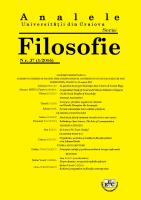ΣΤΕΡΗΣΙΣ: PRIVATIVE NEGATION IN ARISTOTLE AND PSEUDO-DIONYSIUS THE AREOPAGITE
ΣΤέΡΗΣΙΣ: PRIVATIVE NEGATION IN ARISTOTLE AND PSEUDO-DIONYSIUS THE AREOPAGITE
Author(s): Daniel JugrinSubject(s): History of Philosophy, Ancient Philosphy
Published by: Editura Universitaria Craiova
Keywords: Aristotle; Dionysius the Areopagite; alpha privative; privation; negation; privative negation;
Summary/Abstract: The theology of alpha privative flourishes in the late Hellenistic thinking. Aristotle identifies the use of the alpha privative with the logic of privation, and this is the place where the negative theology begins, despite the refusal of Late Platonism to associate the notion of steresis with via negativa. The “apohatic” will eventually be contrasted with the “steretic”, but this distinction is not as clearly emphasized in Aristotle: „Privation (steresis) has as many meanings as there are negations (apophasis) by the alpha privative” (Metaphysics 1022b33). It is noticeable that the privation is equaled with a form of negation, and the alpha privative is included in the logic of privation. In Dionysius we have the first clear tendency to limit privation to the ontological spectrum. The key sequence is the one in the Mystical theology IV, where the “Cause of all” is not and does not contain “alteration, destruction, privation, diminution, or anything else which pertains to what is sensed”. In this context, privation explicitly addresses the sensible world and is associated with various concepts which denote the change of state.
Journal: ANALELE UNIVERSITĂȚII DIN CRAIOVA. SERIA FILOSOFIE
- Issue Year: 1/2016
- Issue No: 37
- Page Range: 39-54
- Page Count: 16
- Language: English

